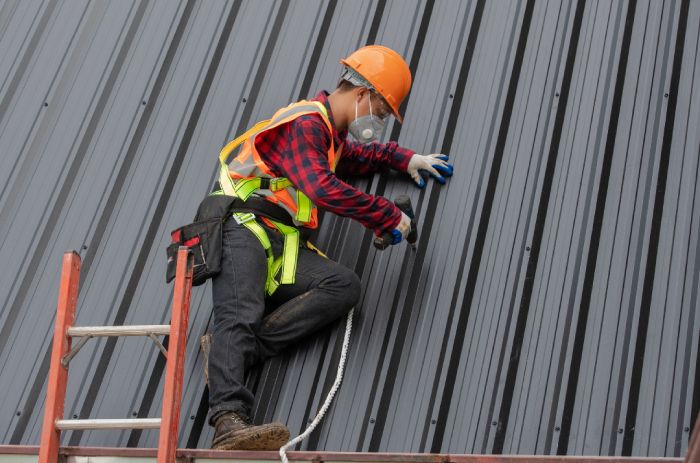Metal Roof

Metal roofs are highly durable, often lasting 40-70 years, and resist severe weather conditions like high winds and heavy rain. They require minimal maintenance and offer energy efficiency through reflective coatings that reduce cooling costs. Environmentally friendly, metal roofs are made from recycled materials and are fully recyclable. They come in various styles and colors, enhancing aesthetic flexibility and providing non-combustible fire resistance. Additionally, metal roofs are lightweight and easy to install, potentially lowering labor costs. Overall, they provide a long-lasting, efficient, and attractive roofing solution.
Key Benefit
Metal roofing offers a range of benefits that make it an appealing option for many homeowners and builders. Here’s a comprehensive look at the advantages of choosing a metal roof:
1. Durability and Longevity
- Long Lifespan: Metal roofs are known for their exceptional durability, often lasting 40-70 years, depending on the material and maintenance. This longevity surpasses that of traditional asphalt shingles.
- Weather Resistance: Metal roofs are highly resistant to extreme weather conditions, including high winds, heavy rain, snow, and hail. They are less likely to crack or become damaged compared to other roofing materials.
2. Low Maintenance
- Minimal Upkeep: Metal roofs require less maintenance than other roofing options. They are resistant to common issues like mold, mildew, and algae growth, which can affect asphalt shingles and other materials.
3. Energy Efficiency
- Reflective Properties: Many metal roofs have reflective coatings that help to reflect solar heat away from the building. This can reduce cooling costs during hot weather by keeping the interior temperature lower.
- Insulation Compatibility: Metal roofs can be paired with insulating materials to improve energy efficiency further, helping to maintain a consistent indoor temperature.
4. Environmental Benefits
- Recyclability: Metal roofing materials are often made from recycled content and are fully recyclable at the end of their life. This makes them a more sustainable choice compared to materials like asphalt shingles, which typically end up in landfills.
- Energy Efficiency: The reflective properties of metal roofs can contribute to energy savings, which indirectly reduces the environmental impact associated with energy consumption.
5. Aesthetic Flexibility
- Variety of Styles: Metal roofs come in a wide range of styles, colors, and finishes, including standing seam panels, metal shingles, and tiles. This allows homeowners to choose a look that complements their architectural style and personal preferences.
- Customization: Metal roofing can be customized to achieve various appearances, from sleek modern designs to traditional styles, offering flexibility to match different home aesthetics.
6. Fire Resistance
- Non-Combustible: Metal roofs are fire-resistant because they are non-combustible. This can provide an extra layer of protection for homes in areas prone to wildfires or other fire hazards.
7. Lightweight
- Reduced Structural Load: Metal roofs are relatively lightweight compared to other roofing materials, such as concrete tiles or asphalt shingles. This can reduce the load on the building’s structure and sometimes eliminate the need for additional support.
8. Ease of Installation
- Quick Installation: Metal roofing panels are typically easier and faster to install than traditional roofing materials, which can lead to reduced labor costs and shorter project timelines.
- Seamless Application: Many metal roofing systems come in large panels that can be installed with fewer seams, reducing the risk of leaks and improving overall performance.
9. Enhanced Property Value
- Increased Resale Value: The durability, energy efficiency, and low maintenance requirements of metal roofs can enhance the resale value of a property. Potential buyers often appreciate the long-term benefits of a metal roof.
10. Protection Against Extreme Weather
- Wind Resistance: Metal roofs are designed to withstand high winds, often up to 140 mph or more, making them ideal for areas prone to hurricanes or tornadoes.
- Snow Shedding: The smooth surface of metal roofs helps snow and ice slide off easily, reducing the risk of ice dams and related damage.
Metal roofing offers a combination of durability, energy efficiency, aesthetic versatility, and environmental benefits that make it a compelling choice for many homeowners and builders. While the initial cost of a metal roof may be higher than some traditional materials, the long-term savings in maintenance, energy costs, and durability often outweigh the initial investment. For those seeking a reliable, low-maintenance, and stylish roofing option, metal roofing presents a strong solution
Metal Shingles
Description: Individual metal panels designed to resemble traditional shingles. Available in various styles and colors.
Materials: Commonly made from steel or aluminum.
Applications: Ideal for residential properties seeking a traditional look with metal durability
Zinc Roofing
Description: Features a sleek, modern look with natural patina development.
Materials: Pure zinc or zinc alloys.
Applications: Ideal for residential and commercial buildings seeking a unique, durable roofing solution.
Metal Roof Panels
Description: Flat panels with various profiles, including ribbed or flat designs.
Materials: Commonly made from steel, aluminum, or copper.
Applications: Used in both residential and commercial settings for a sleek, modern look.
Corrugated Metal Roof
Description: Features wavy or ridged metal panels. Known for its strength and ease of installation.
Materials: Usually made from galvanized steel, aluminum, or stainless steel.
Applications: Common in agricultural, industrial, and some residential buildings.
Copper Roof
Description: Known for its distinctive appearance and natural patina that develops over time.
Materials: Pure copper.
Applications: Used in high-end residential and historic buildings for its aesthetic appeal and longevity.
Aluminium Roof
Description: Lightweight and resistant to corrosion. Often used in coastal areas.
Materials: Pure aluminum or aluminum alloys.
Applications: Suitable for residential and commercial properties, especially in corrosive environments.
